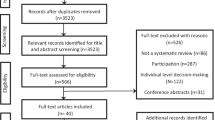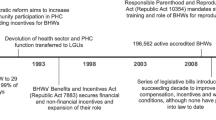Abstract
Background In Nigeria, only medical doctors, dentists and some nurses in primary care facilities have the legal right to prescribe medicines to patients. Patients’ access to prescription medicines can be seriously affected by the shortage of prescribers leading to longer waiting times in hospitals. Objective This research was carried out to investigate stakeholders’ views on granting prescribing authority to pharmacists in Nigeria. Setting The study was conducted in Nigeria. Methods Qualitative, semi-structured interviews were conducted with 43 Nigerian stakeholders including policymakers, pharmacists, doctors and patient group representatives. Transcribed interviews were entered into the QSR NVivo 10 software and analysed using a thematic approach. Main outcome measure Stakeholders’ perception on the granting of prescribing authority to pharmacists in Nigeria. Results Three major themes emerged from the interviews: (1) prescribing as a logical role for pharmacists, (2) pharmacist prescribing- an opportunity or a threat and (3) the potential barriers to pharmacist prescribing. Many non-medical stakeholders including pharmacists and patient group representatives supported an extended role for pharmacists in prescribing while the majority of medical doctors including those in policy making were reluctant to do so. Generally, all stakeholders perceived that pharmacist prescribing represents an opportunity to increase patients’ access to medicines, reduce doctors’ workload and promote the utilisation of pharmacists’ skills. However, many stakeholders including pharmacists and doctors commonly identified pharmacists’ inadequate skills in diagnosis, medical resistance and shortage of pharmacists as potential barriers to the introduction of pharmacist prescribing in Nigeria. Conclusion The present study showed a split of opinion between participants who were medical doctors and those who were non-doctors in their support for pharmacist prescribing. However, all stakeholders acknowledged the potential of pharmacist prescribing to increase patients’ access to medicines in Nigeria.
Similar content being viewed by others
References
Review of prescribing, supply & administration of medicines. Final report. 1999. http://webarchive.nationalarchives.gov.uk/20130107105354/ http://www.dh.gov.uk/prod_consum_dh/groups/dh_digitalassets/@dh/@en/documents/digitalasset/dh_4077153.pdf. Accessed 30 Mar 2016.
Kroezen M, Van Dijk L, Groenewegen PP, Francke AL. Nurse prescribing of medicines in Western European and Anglo-Saxon countries: a systematic review of the literature. BMC Health Serv Res. 2011;11:127.
Stewart D, MacLure K, George J. Educating nonmedical prescribers. Br J Clin Pharmacol. 2012;74(4):662–7.
Bhanbhro S, Drennan VM, Grant R, Harris R. Assessing the contribution of prescribing in primary care by nurses and professionals allied to medicine: a systematic review of literature. BMC Health Serv Res. 2011;11:330.
Tonna AP, Stewart D, McCaig D. An international overview of some pharmacist prescribing models. J Malta Coll Pharm Pract. 2008;14:20–6.
Pharmacy Council of New Zealand. Pharmacist Prescribers. http://www.pharmacycouncil.org.nz/cms_display.php?st=1&sn=232. Accessed 30 Mar 2016.
Yariv H. The case of pharmacist prescribing policy in Israel. Isr J Health Policy Res. 2015;4(1):49.
Nissen L. Hospital talk: pharmacist prescribing-the perfect storm? Aust J Pharm. 2014;95:29.
National Drug Policy-Nigeria. Abuja: Federal Ministry of Health, Nigeria and World Health Organisation; 2005. http://apps.who.int/medicinedocs/documents/s16450e/s16450e.pdf. Accessed 30 Mar 2016.
Ehiri JE, Oyo-Ita AE, Anyanwu EC, Meremikwu MM, Ikpeme MB. Quality of child health services in primary health care facilities in south-east Nigeria. Child Care Health Dev. 2005;31(2):181–91.
Access to and rational use of medicines at the facility level. Abuja: Federal Ministry of Health, Nigeria; 2010.
Babalola CP, Awoleye SA, Akinyemi JO, Kotila OA. Evaluation of prescription pattern in Osun State (Southwest) Nigeria. J Public Health Epidemiol. 2011;3(3):94–8.
Fagbule D, Kalu A. Case management by community health workers of children with acute respiratory infections: implications for national ARI control programme. J Trop Med Hyg. 1995;98(4):241–6.
Akande T. Referral system in Nigeria: study of a tertiary health facility. Ann Afr Med. 2004;3(3):130–3.
Oyedeji R, Abimbola S. How tertiary hospitals can strengthen primary health care in Nigeria. Nig Med J. 2014;55(6):519–20.
Umar I, Oche MO, Umar AS. Patient waiting time in a tertiary health institution in Northern Nigeria. J Public Health Epidemiol. 2011;3(2):78–82.
Ajayi IO. Patients’ waiting time at an outpatient clinic in Nigeria—can it be put to better use? Patient Educ Couns. 2002;47(2):121–6.
World Bank. Physicians (per 1000 people). http://data.worldbank.org/indicator/SH.MED.PHYS.ZS. Accessed 30 Mar 2016.
Oche M, Adamu H. Determinants of patient waiting time in the general outpatient department of a tertiary health institution in north Western Nigeria. Ann Med Health Sci Res. 2014;3(4):588–92.
Alo A. Pharmacy in Nigeria. Am J Health Syst Pharm. 2006;63:670–3.
WAPCP Listing of fellows of the college (1991–2011). http://www.wapcp.info/sites/default/files/news_attachments/wapcp_listing_of_fellows1991-2011.pdf. Accessed 1 Feb 2013.
Auta A, Maz J, Strickland-Hodge B. Perceived facilitators to change in hospital pharmacy practice in England. Int J Clin Pharm. 2015;37(6):1068–75.
Erhun WO, Osigbesan T, Awogbemi JK. Study of pharmacists’ and physicians’ views on pharmacists prescribing in Nigeria. West Afr J Pharm. 2013;24(2):76–82.
Auta A, Bala ET, Shalkur D. Generic medicine substitution: a cross-sectional survey of the perception of pharmacists in North-Central, Nigeria. Med Princ Pract. 2014;23(1):53–8.
Auta A, Fredrick NC, David S, Banwat SB, Adeniyi MA. Patients’ views on their consultation experience in community pharmacies and the potential prescribing role for pharmacists in Nigeria. J Pharm Health Serv Res. 2014;5:233–6.
Braun V, Clarke V. Using thematic analysis in psychology. Qual Res Psychol. 2006;3(2):77–101.
De Vries T, Henning RH, Hogerzeil HV, Fresle DA. Guide to Good Prescribing. A Practical Manual. Geneva: World Health Organization Action Programme on Essential Drugs; 1994.
Nissen L. Pharmacist prescribing: what are the next steps? Am J Health Syst Pharm. 2011;68(24):2357–61.
Kondro W. Canada’s doctors assail pharmacist prescribing. CMAJ. 2007;177(6):558.
Gilbert L. Pharmacy’s attempts to extend its roles: a case study in South Africa. Soc Sci Med. 1998;47(2):153–64.
Britten N. Prescribing and the defence of clinical autonomy. Sociol Health Illn. 2001;23(4):478–96.
Eaton G, Webb B. Boundary encroachment: pharmacists in the clinical setting. Sociol Health Illn. 1979;1(1):69–89.
South African Pharmacy Council. Scope of practice and qualification for authorised pharmacist prescriber. Board Notice 122 of 2011. Government Gazette No. 34428.
Stewart DC, George J, Bond CM, Diack HL, McCaig DJ, Cunningham S. Views of pharmacist prescribers, doctors and patients on pharmacist prescribing implementation. Int J Pharm Pract. 2009;17(2):89–94.
Courtenay M, Carey N, Stenner K, Lawton S, Peters J. Patients’ views of nurse prescribing: effects on care, concordance and medicine taking. Br J Dermatol. 2011;164(2):396–401.
Nigeria Demographic and Health Survey 2008. Abuja: National Population Commission and ORC Macro, 2009. http://www.dhsprogram.com/pubs/pdf/FR222/FR222.pdf. Accessed 30 Mar 2016.
Ward K, Sanders D, Leng H, Pollock AM. Assessing equity in the geographical distribution of community pharmacies in South Africa in preparation for a national health insurance scheme. Bull World Health Organ. 2014;92(7):482–9.
Oparah AC, Arigbe-Osula EM. Evaluation of community pharmacists’ involvement in primary health care. Trop J Pharm Res. 2002;1(2):67–74.
World Health Organization. Nigeria still searching for right formula. 2015. http://www.who.int/bulletin/volumes/86/9/08-020908/en/. Accessed 22 June 2015.
Pharmacists Council of Nigeria. Full registration list of Pharmacists as at 2nd October, 2014. http://pcn.gov.ng/WEB%20full%20registration%20list.pdf. Accessed 11 Nov 2014.
Acknowledgments
The authors would like to thank all participants for their valuable time and contributions to this research.
Funding
No financial support was obtained for this study.
Conflicts of interest
The authors do not have any conflict of interest to declare.
Author information
Authors and Affiliations
Corresponding author
Rights and permissions
About this article
Cite this article
Auta, A., Strickland-Hodge, B. & Maz, J. Stakeholders’ views on granting prescribing authority to pharmacists in Nigeria: a qualitative study. Int J Clin Pharm 38, 960–967 (2016). https://doi.org/10.1007/s11096-016-0321-6
Received:
Accepted:
Published:
Issue Date:
DOI: https://doi.org/10.1007/s11096-016-0321-6




